 полная версия
полная версияBlackwood's Edinburgh Magazine, Volume 64, No. 393, July 1848
Mr Labouchere said, in the debate on this subject in the House of Commons, that the Protection Party seemed to consider every importation as in itself an evil, inasmuch as it displaced a corresponding amount of native industry; but that till he found that goods were brought by merchants into the country for nothing, he never could see how importation did not encourage domestic industry as much as home orders. This is manfully spoken: it comes home to the kernel of the question. It is pleasing to have to contend with such an antagonist. We will answer him equally briefly, and, as it seems to us, decisively. The difference between home orders and foreign orders is this, that the one encourages industry at both ends, viz., in the consumers and the producers; the other, at one end only, viz., in the consumer. This difference, however, may become vital to the national fortunes. If a London merchant pays £20,000 a-year to British shipowners and seamen, he keeps in motion at once the industry of the consumers, by whose produce the freights are ultimately paid, and the industry of the seafaring classes by whom they are earned. But if he pays the £20,000 a-year not to British but foreign shipowners, the only industry put in motion, so far as we are concerned, is that which raises the produce which is to pay the freight. The other end of the chain is placed in Norway or America, and any encouragement to industry there afforded is wholly lost to England. It is just the difference between rents spent in Great Britain, and rents spent in Paris or Naples.
Doubtless they are the same thing, so far as the whole world is concerned; but are they the same thing so far as that portion of the world in which we are interested, viz., the British Islands, is concerned? Unquestionably they are not. What the Protectionists say is, not that no British industry is encouraged when importation takes place: they know perfectly it is encouraged at their end of the line; what they say is, that it is not encouraged at the other end, because that other end rests in foreign states; and that it is unwise to encourage industry at one end only, when it is possible to do so at both. Adam Smith saw this perfectly when he so well explained the difference between the home trade and foreign trade, and said the former was "worth all foreign trade put together." But his observations on this head are as much forgotten by the majority of our legislators as those he made on the great wisdom of our Navigation Laws, as the only security for our national independence.
Mr M'Gregor said in debate on the same subject, that "he admitted our naval strength had co-existed with the Navigation Laws, but he denied that they were cause and effect. They had about as much to do with each other as the height of the Pyramids had with the floods of the Nile."9 We agree with the honourable member for Glasgow in one part of this observation. The Navigation Laws have had as much to do with our maritime prosperity as the Pyramids had with the floods of the Nile; and we will tell the ex-secretary of the board of trade what the relation was – it was that of cause and effect. Mr M'Gregor is too well informed not to know that there exists in Cairo a Nilometer, and that, during the period of the inundation, the spirits of the people and the animation of commerce rise and fall with the rise or fall of the prolific stream. It is no wonder they do so, for it is the source of life and prosperity to the whole community. Raised by the power of the Pharaohs from the riches produced by the inundations of former times, the Pyramids are the Nilometer of antiquity, as much as the tower of Babel and the ruins of Babylon were the monument of the opulence of the plain of Shinar; or as Waterloo Bridge is of the wealth produced by the favourable maritime situation of London, or York Cathedral of the agricultural riches of the plains of Yorkshire. In all these causes there is a relation between the natural advantages which produce the riches and the durable monument to the construction of which they lead, and that relation is that of cause and effect. We entirely concur with the member for Glasgow in thinking that the same connexion, and no other, subsists between the Navigation Laws and the maritime greatness of England as existed formerly between the Pyramids of Egypt and the fertilising floods which encircle their base.
To prove that these remarks are not made at random, but that the Navigation Laws really are the foundation of the maritime greatness of England, and that, when they are repealed, it must of necessity languish and ultimately expire, we subjoin three tables: one showing the progress of British as compared with foreign shipping, from 1801 to 1823, when the protection of the Navigation Laws was first infringed upon by the adoption of the reciprocity system with the Baltic powers; and another showing the comparative progress of our foreign and home shipping with Sweden, Norway, Denmark, and Prussia, the countries with whom reciprocity treaties were first concluded, from 1823 to the end of 1847, when the reciprocity system had been a quarter of a century in operation.
Table showing the comparative progress of British and Foreign Tonnage inwards, from 1821 to 1847, both inclusive, with Sweden, Norway, Denmark, and Prussia.
[Transcriber's note: Column headings: Y=Year. Bt=Brit. tons. Ft=For. tons.]
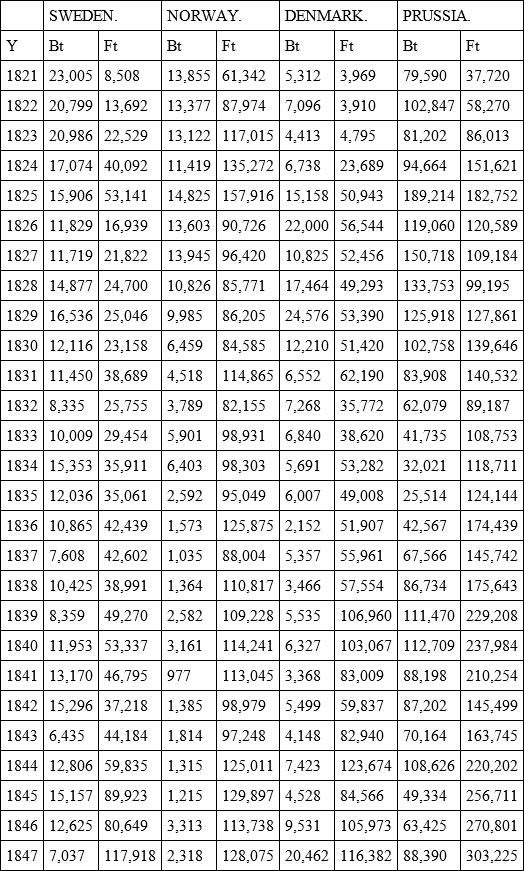
– Porter's Parliamentary Tables; and Parliamentary Report, 3d April 1848.
Thus, while our shipping with the whole world quadrupled, as compared with the foreign employed in the same trade, under the protective system, from 1801 to 1823; it declined under the reciprocity system of equal duties, in the countries to which that system was applied in the next twenty years, till it had dwindled to a perfect fraction; – our tonnage with Sweden being, in 1847, not more than a sixteenth part of the foreign; with Norway, a fiftieth part; with Denmark somewhat above a sixth; with Prussia somewhat under a fourth.
But then it is said these are selected states which do not give a fair average of the reciprocity system, or afford a correct criterion of its probable effects when applied, as it is about to be by a general repeal of the Navigation Laws, to the whole world. If they are "selected states," we can only say they were selected by Mr Huskisson and the Free-traders themselves as likely to afford the best specimen of the effect of their principles, and therefore as the first on which the experiment was to be made. But we are quite willing to take the general tonnage of the empire as the test; and we shall commence with a quotation from the tables of the great statistical apostle of free trade, Mr Porter, to show the effect of free trade in shipping on the comparative growth of our whole tonnage, as compared with that of foreign states, from 1801 to 1823, when the reciprocity system began; and again from thence lo 1847, when free trade in shipping was in full operation by the temporary suspension of the Navigation Laws, from the effect of the Orders in Council in March 1847 suspending the Navigation Laws under the pressure of the Irish famine: —
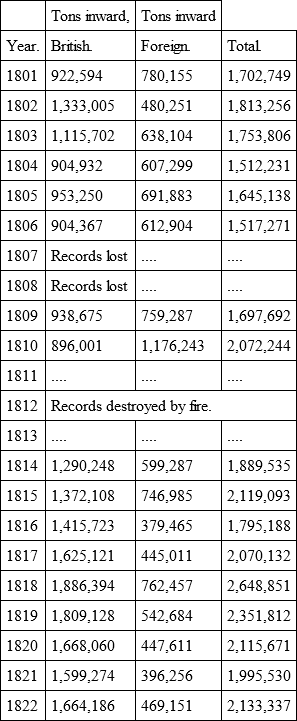
– Porter's Progress of the Nation, 407.
It appears from this most instructive table that, under the protection system, from 1801 to 1823, the British shipping employed in conducting our commerce had gained so decisively on the foreign employed in the same commerce, that it had increased, from having been on an average of five years, at the commencement of the second, about two British tons to one foreign, to be, on the last five years, about four British tons to one foreign: in other words, during these twenty-two years, the proportion of British to foreign shipping had doubled.
Turn now to the contrast afforded by the comparative progress of British and foreign shipping from 1823, when the reciprocity system was introduced with certain states, to 1847, when it was made universal by the suspension of the Navigation Laws in March of that year: —
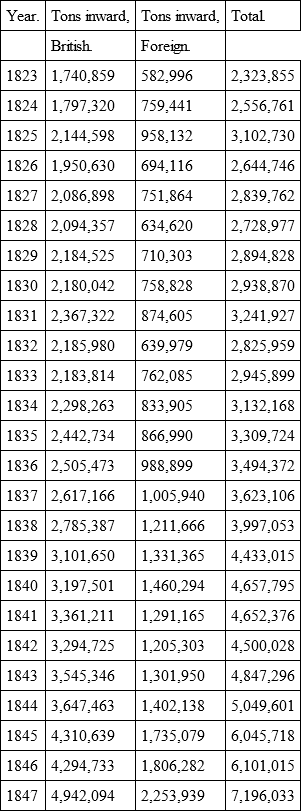
– Porter's Progress of the Nation, 407, 2d edition;
and Parliamentary Paper, 3d April 1848.
Thus it appears that under the reciprocity system with some countries since 1823, and free trade in shipping with all in 1847, the foreign shipping employed in carrying on the British trade had so rapidly grown upon the British, that, while at the commencement of the period the British stood to the foreign as 174 to 58, or 3 to 1 exactly, at the close they stood as 49 to 22, or somewhat above 2 to 1 only. And observe the vast start of foreign shipping as compared with British, since free trade was introduced by Sir R. Peel in 1846. For while the British tonnage was to the foreign in 1845 as 43 to 17, or as 21⁄2 to 1; in the year 1847 it was as 49 to 229, or 21⁄3 to 1 only. So rapid has been the growth of foreign shipping over British in eighteen months of general free trade. In ten years of such a system, it is easy to see that the foreign tonnage employed in carrying on our trade will be equal to the British; and then our national independence is gone for ever, for we have nursed up in our harbours a body of foreign seamen equal to our own.
But we have not yet done with the parliamentary returns. From the return 3d April 1848, it appears that the total tonnage, British and foreign, employed in carrying on our trade was —

Deduct British and foreign tons employed in the colonial trade, viz. —
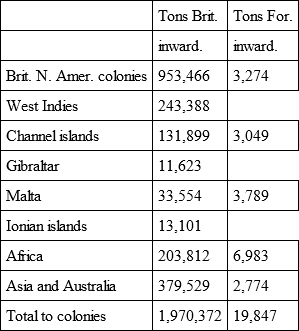
Thus the British trade to our colonial settlements is about a hundred times the foreign, and constitutes nearly a third of the whole tonnage employed in carrying on our commerce, and about two-fifths of the total British tonnage, – (1,970,372 out of 4,942,094.)
But it is important to discover what proportion the British tonnage employed in conducting our trade with all the world, except our colonies, bears to the foreign tonnage employed in the same work. That is easily found: —

So that, setting aside our colonial trade, the British tonnage is to the tonnage with all the rest of the world as 29 to 22, or as 4 to 3 only! Considering the rapid strides which, under the reciprocity system established only with a limited number of countries in 1823, the foreign shipping is making in encroachment upon the British, this fact affords room for the most serious reflections. It is clear, from the great advance of foreign over British shipping in the single year of temporary suspension of the Navigation Laws, under the pressure of famine in 1847 – viz. from 1,735,679, to 2,253,979; while the British in the same period advanced only from 4,310,639, to 4,942,094, – that two or three years of free trade in shipping will bring the foreign vessels employed in conducting our trade, exclusive of those engaged in the colonial, to an equality with the British. The moment that period arrives, our maritime superiority, and with it our national independence, hang entirely on our colonial trade, which, and which alone, strikes the balance at present in our favour. And yet, the colonial trade is the precise thing which it is the object of the repeal of the Navigation Laws to throw open to foreign nations! In their anxiety to cheapen every thing, the Free-traders would gladly expose our shipping interest engaged in the colonial trade to the same competition, which has already proved so disastrous to that part of it which is engaged in the traffic with foreign nations.
Observe how one false step in policy by nations, like one deviation from virtue in private life, leads by natural consequences to a repetition of errors and crimes, till irreparable ruin ensues. The agricultural interest at home was first attacked; and by the cry of cheap bread, and the weight of class legislation, its protection was taken away. The West India islands were the next victims; because, if the farmer in England raises his wheat with nothing but a nominal protection, it was plausible to say the West India planter must raise his sugar on the same terms. The ruinous competition to which this exposed the West India planters naturally produced in them a desire to be liberated from any burdens to which they were subjected for the benefit of the mother country; and in this demand the Canadians, exposed to the competition of American grain, for a similar reason concurred. Thus the cry for cheap freights, originating in free-trade principles in England, came to be responded to from the British colonies on the other side of the Atlantic; and the Navigation Laws began to be repudiated by the colonies – the very thing which formerly it was their most anxious desire to uphold. The firm though unseen bond of mutual interest, founded on protective principles, which has hitherto held together the vast and widely separated dominions of the British empire, is dissolved. Being deprived of the benefit of protection, they very naturally wished to be relieved of its burdens. Such is the maze of error and danger into which we have been led by the sophistry of free trade; and such the way in which the greatest and best consolidated empires are first loosened, and then destroyed, by the delusions of those entrusted with their guidance.
The manner in which foreign shipping has encroached upon British, since the reciprocity system began in 1823, is clearly proved by the centesimal proportions of each, published by Mr Porter, from 1820 to 1844, both inclusive.
It will be seen from the following table, that, since 1820, the centesimal proportion of British shipping employed in conducting our trade has declined from 78 to 72, while that of foreign nations has increased from 21 to 27. But this proportion, such as it is, is solely upheld by our colonial trade, which, as already shown, employs nearly 2,000,000 tons of our shipping. But for it, the encroachment of foreign on British shipping would appear in such alarming colours as to strike the most inconsiderate. It is the rapid growth of our colonial trade under the protective system which has alone concealed the ravages effected on it by free trade under the reciprocity.
Centesimal Proportions of the British and Foreign Tonnage employed in the Import Trade of the United Kingdom from 1820 to 1844.
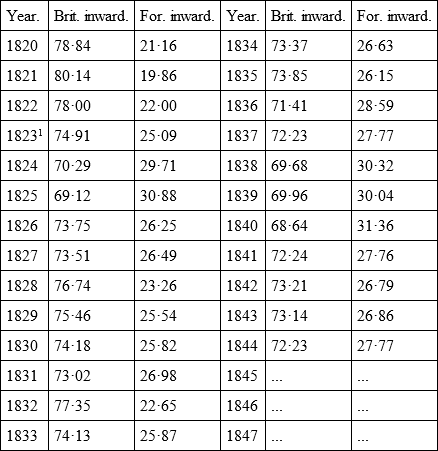
– Porter's Progress of the Nation, 416, 2d edition.
1Reciprocity System introduced.
Mr Porter himself tells us that the centesimal proportion of our trade with the European powers has declined (p. 410) from 65 to 52·38, while that of our colonies has increased thus, —

Such has been the working of the reciprocity system, as compared with the protective and colonial – in other words, free trade in shipping with some particular nations – in twenty years. And it is from this experience of the effects of the partial adoption of these principles that the Free-traders now propose to make it universal!
America is the country to which, in comparison with Great Britain, the Free-traders constantly refer for a demonstration of the justice and beneficial operation of their principles. We accept the instance, and proceed to inquire into the comparative value of the American protected trade with our own colonies, and the American free trade with the United States, both at this time and in the respective progress of each for the last twenty-five years.
The foreign and British tonnage with the United States, Canada, and the West Indies, in the year 1847, stood thus, viz.: —

– Parliamentary Paper, 3d April 1848.
So that, while our West India and North American colonies, under this Protective system, support 1,196,854 tons of British shipping against 3,724 of foreign, or 300 to 1 nearly; the American trade with the United States only maintains 437,095 of British against 651,189 of foreign; in other words, about 2 to 3 nearly! But the Free-traders think it better to adopt the system which makes the foreign shipping to the British as 3 to 2, than uphold the one which has brought the foreign shipping to the British, in the colonial trade, as 1 to 300!
Observe, too, the decisive proof which the same return affords of the vast superiority, in every point of view, of our colonial trade to our foreign, even in the hands of our best free-trade customers, the Americans. For while less than 3,000,000 of souls between the West India and North American colonies furnished employment to 1,197,000 tons of British and foreign shipping, of which 1,193,000 was British; twenty millions of Americans in the United States only furnished employment to 1,088,284 tons of shipping, in all of which no more than 437,095 were British! And this is the pet instance of the Free-traders – their favourite cheval de bataille– to demonstrate the great superiority of free and foreign over protected and colonial trade!
Again, if we take the comparative progress of British and American tonnage in conducting the trade of the United States, since the reciprocity system was begun in 1823, the same conclusion is forced upon the mind. Not only is the American shipping, throughout the whole period, superior to the British in the proportion generally of 3 to 1, but this superiority in their favour remains undiminished in any material degree. We take the following returns from Mr Porter: —
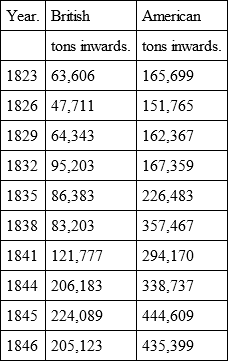
It is easy to see how it has happened that, in competition with the shipowners of every country, the British shipowners have suffered so much under the partial operation of the free-trade principles which the reciprocity system has afforded. It is the inevitable fate of the old and the rich state, in shipbuilding and agriculture, to be undersold by the young and the poor one. The reason is, that the old state, by the very magnitude of its wealth, the amount of its transactions, the number of its inhabitants, the multitude of its fabrics, is obliged to pay much higher for labour and materials of all sorts than the young and the poor one. Machinery and the steam-engine compensate, and more than compensate, this superiority in regard to manufactured articles. England undersells Hindostan, where wages are a penny or twopence a day, by the work of steam-power looms working on cotton raised on the banks of the Ganges. But there is no steam-power loom in shipbuilding any more than in agriculture. Great things in nautical affairs, as in rural economy, can be effected only by the labour of man's hands and the sweat of his brow, in the last ages of civilisation, as in the first. It would appear to be a permanent law of nature, to which there is no exception in any age of the world, or any stage of human progress, that the chief branches of industry on which the subsistence and defence of nations rest – agriculture, and the naval and military arts – are pursued more cheaply, and with more success by young and rising than old and opulent states. History is full of examples in which the manufactures of rich and ancient nations have obtained an undisputed supremacy over the fabrics of poor and rising ones; but it presents still more examples of the encroachments made on the industry and power of old nations by the agricultural produce, or naval and military efforts, of young ones. It is this law of nature which provides for the decay and ruin of nations when they are approaching the limit of their allotted space of existence, and should give place to others entering on the career which they have terminated. No efforts of human energy or virtue can prolong, for any considerable period, this allotted space. But it is the peculiar reproach of free trade, whether applied to agriculture or nautical affairs, that it tends to shorten, instead of prolonging, the life of the nation to which it is applied, by oppressing instead of relieving those vital branches of industry on which its existence depends, and thus both aggravates the natural evils incident to old age, and accelerates the approach of the political society to the tomb.
When Mr Huskisson, in 1823, introduced the Reciprocity System, he did not dispute that it would injure our maritime interests; but he contended that it would open a new field for our manufactures, – that the time had now arrived when the Protective System could no longer be maintained, and it had become indispensable to sacrifice to a certain extent our maritime interests, in order to preserve the chief vents on Continental Europe for the industry of our artisans. The sacrifice was made, and the tables already given show with what fatal effect to our shipping interest. Has it extended the market for our manufactures, or diminished the jealousy with which they are regarded by the states of Continental Europe? Let the Zollverein league, at the head of which Prussia has placed herself, and which has imposed duties to an amount, in practical operation, of fifty per cent on our manufactures, give the answer. The exports which we send to the states of Sweden, Norway, Denmark, and Prussia, are still, after a quarter of a century's experience of the immense impulse it has given to their maritime interests, and corresponding depression to ours, a perfect trifle.10 Our exports to America are less than they were fifteen years ago, despite the boasted conciliatory effect of twenty years' reciprocity.11 What can be more injudicious, therefore, than to persist in, and even extend, a system which, without diminishing in the slightest degree the jealousy of Continental nations at our manufacturing superiority, has inflicted a serious and gratuitous wound on the naval resources by which alone that superiority can be maintained?
We have recently made a very great stride in free-trade principles, by the sacrifice of our agricultural protection, and the throwing open the English markets to cultivators of all nations. In the three last months of 1846 and even of 1847, in consequence of the import duties being removed, above £30,000,000 sterling was sent out of the country to purchase foreign grain; and the moderate duty of eight shillings a quarter has since been reimposed on wheat, – yet it terminates in February next, and corn from all quarters will then be admitted for the nominal duty of one shilling a quarter. We have abandoned the protection of our colonies to conciliate the slave-growing states, and augment the market for Manchester goods in Cuba and Brazil. With what disastrous effects these changes have been attended, upon the best interests of the empire, need be told to none who are familiar with the total ruin which has in consequence overtaken our West India colonies, and the unprecedented distress which prevails in all the great seats of our manufacturing industry. The loss of half the realised wealth of Liverpool, Manchester, and Glasgow, and the creation of nearly a hundred thousand persons, including dependants, in a state of pauperism, in each of those once rich and prosperous cities, is the price which, in a year and a half, we have paid for the adoption by Sir R. Peel of Mr Cobden's principles of free trade, and Mr Jones Loyd's principles of a fettered currency. Have we, in consequence, reaped any countervailing advantage, or does the increase of our export and import trade show any benefit derived to the nation, to compensate such dreadful wounds inflicted on its internal prosperity, in the attempt to disarm the jealousy of foreign manufacturers? So far from it, our exports and imports have steadily declined since free-trade principles were introduced. All the main sources of our strength have diminished since Sir R. Peel abandoned protection in July 1846.12 In adopting these principles, we have gratuitously inflicted a grievous wound on our own people, without having obtained for them the shadow even of a benefit to compensate the evil.









